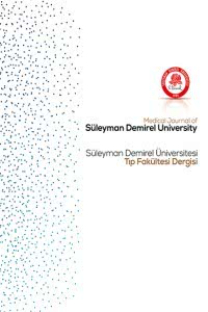Devital dişlerin intrakoronal ağartmasında kullanılan iki farklı materyalin klinik etkinliğinin karşılaştırılması
Diş ağartma, Diş renklenmeleri, Diş, ölü, Hidrojen peroksit, Perasetik asit
Comparison of the clinical efficiancy of two materials used for intracoronal bleaching of devital teeth
Tooth Bleaching, Tooth Discoloration, Tooth, Nonvital, Hydrogen Peroxide, Peracetic Acid,
___
- 1. Eisenberg E, Bernick S M: Anomalies of the teeth with stains and discolorations. J Prev Dent 1975 Jan-Feb;2:7-14
- 2. Glockner K, Ebeleseder K, Stadtler P: Das Bleichen von verfarbten Frontzahnen. Schweiz Monatsschr Zahnmed 1997;107(5):413-25
- 3. Feinman RA,Goldstein RE,Garber DA. Bleaching teeth. 1st edn, p. 9. Quintessence Publishing, Chicago.;1987;9-13.
- 4) Pearson HH. Bleaching of the discolored pulpless tooth. J Am Dent Assoc. 1958 Jan; 56 (1): 64-8. In: Dag Orstavik, Thomas Pitt Ford. Essential Endodontology. Blackwell Science, London ,1998, p.334-335
- 5) al-Nazhan S. External root resorption after bleaching: A case report. Oral Surg Oral Med Oral Pathol. 1991 Nov;72(5):607-9
- 6. Brosjo M, Anderssen K, Berg JO, Lindskog S. An experimental model for cervical resorption in monkeys. Endod Dent Traumatol. 1990 Jun;6(3):118-20.
- 7. Friedman S, Rotstein I, Libfeld H, Stabholz A, and Helmig II. Incidence of external root resorption and esthetic results in 58 bleached pulpless teeth. Endod Dent Traumatol 1988 Feb;4 (1):23-6.
- 8. Goon W, Cohen S, Borer R. External cervical root resorption following bleaching. J Endod 1986 Sep;12 (9): 414-8
- 9. Harrington GW, Natkin E. External resorption associated with bleaching of pulpless teeth. J Endod 1979 Nov; 5(11): 344-8.
- 10. Latcham NL. Postbleaching cervical resorption. J Endod 1986;Jun; 12(6): 262-4
- 11. Cvek M, Lindvall AM. External root resorption following bleaching of pulpless teeth with oxygen peroxide. Endod Dent Traumatol 1985 Apr;;1(2):56- 60.
- 12. Madison S, Walton R.Cervical root resorption following bleaching of endodontically treated teeth. J Endod. 1990 Dec;16(12):570-4.
- 13. Casey LJ, Schindler WG, Murata SM, Burgess JO. The use of dentinal etching with endodontic bleaching procedures. J Endod 1989;15(11):535-8
- 14. Barbosa SV, Safavi KE, Spangberg SW. Influence of sodium hypochlorite on the permeability and structure of cervical human dentine. Int Endod J. 1994 Nov;27(6):309-12.
- 15. Holmstrup G, Palm AM, Lambjerg-Hansen H. Bleaching of discolored root-filled teeth. Endod Dent Traumatol 1988; 4: 197-201
- 16. Lado EA, Stanley HR, Weisman MI. Cervical resorption in bleached teeth. Oral Surg 1983; 55: 78-80
- 17. Latcham NL. Management of a patient with postbleaching cervical resorption. A clinical report. J Prosthet Dent 1991; 65: 603-5
- 18. Gimlin DR,Schindler WG. The management of postbleaching cercival resorption .J Endod 1990; 16:292-7
- 19. Montgomery S. External cercival resorption after bleaching a pulpless tooth.Oral Surg 1984;57: 203-6
- 20. Warren W,Wong M,Ingram T. An in vitro comparision of bleaching agents on the crowns and roots of discolored teeth. J Endod 1990;16: 463-7
- 21. Rotstein I, Zyskind D, Lewinstein I, Baumberger N, Effec of different protective base materials on hydrogen peroxide leakage during intracoronal bleaching in vitro.J Endod 1992;18:114-7
- 22. Smith JJ, Cunningham CJ, Montgomery S. Cervical canal leakage after internal bleachingi. J Endod. 1992 Oct;18(10):476-81.
- 23. Ho S, Goerig AC. An in vitro comparison of different bleaching agents in the discolored tooth. J Endod 1989;15: 106-111
- ISSN: 1300-7416
- Yayın Aralığı: Yılda 4 Sayı
- Başlangıç: 1994
- Yayıncı: SDÜ Basımevi / Isparta
Göz içi basınç ölçümünde hata kaynakları
Yeni doğan bebeklerde önemli bir hematolojik sorun: Polisitemi
Obez hastalarda kısa dönem (1 aylık) orlistat tedavisinin plazma lipid düzeylerine etkisi
Ercan VAROL, Mehmet ŞAHİN, S. Murat ASLAN, Mehmet ÖZAYDIN, Ahmet ALTINBAŞ
Gastrointestinal sistem amiloidozisine bağlı demir eksikliği anemisi: Olgu sunumu
Osman AYDIN, Mehmet ŞAHİN, Ülkü ERGENE, İbrahim Metin ÇİRİŞ
Recep SÜTÇÜ, Duygu DOĞUÇ, Onur AKTÜRK, İrfan ALTUNTAŞ, Namık DELİBAŞ
Tc 99m-MDP nin kemik mineral yoğunluğu değerlerine etkisi
Mustafa YILDIZ, EKREM ÇİÇEK, S. Süreyya ÇERÇİ, Harun SÜSLÜ, Meltem ÖZBEK
Vulvar koristom; bir olgu sunumu
Şirin BAŞPINAR, Nilgün KAPUCUOĞLU
Akciğerlerin aksesuar fissürleri
Cenk KILIÇ, Necdet KOCABIYIK, BÜLENT YALÇIN, Yalçın KIRICI, Fatih YAZAR, Hasan OZAN
